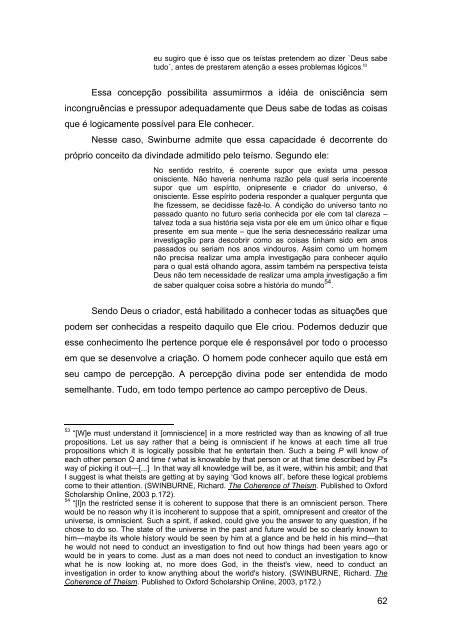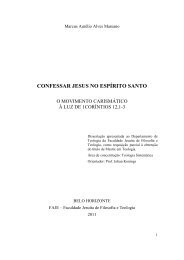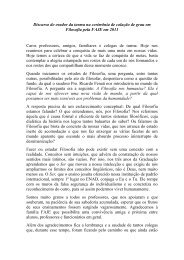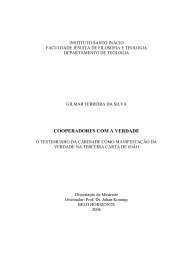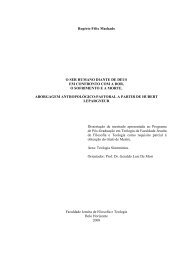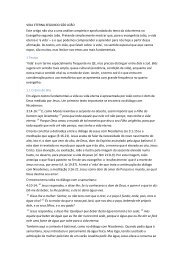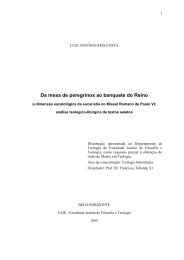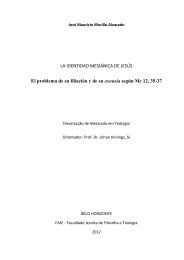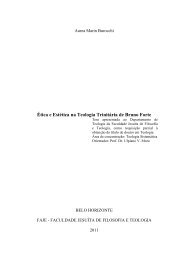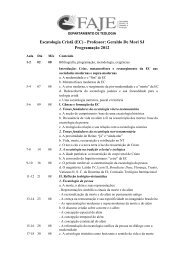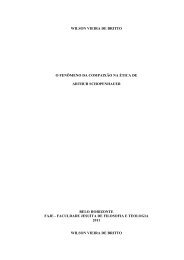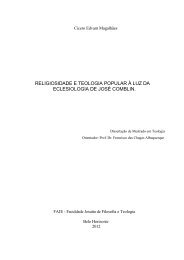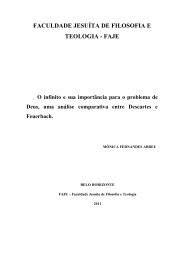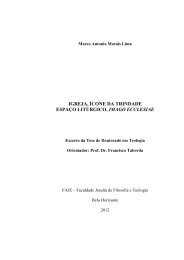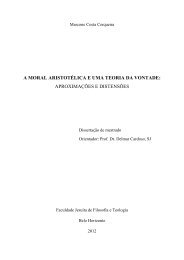o teÃsmo e o problema do mal em richard swinburne - FaJe
o teÃsmo e o problema do mal em richard swinburne - FaJe
o teÃsmo e o problema do mal em richard swinburne - FaJe
Create successful ePaper yourself
Turn your PDF publications into a flip-book with our unique Google optimized e-Paper software.
eu sugiro que é isso que os teístas pretend<strong>em</strong> ao dizer `Deus sabe<br />
tu<strong>do</strong>´, antes de prestar<strong>em</strong> atenção a esses <strong>probl<strong>em</strong>a</strong>s lógicos. 53<br />
Essa concepção possibilita assumirmos a idéia de onisciência s<strong>em</strong><br />
incongruências e pressupor adequadamente que Deus sabe de todas as coisas<br />
que é logicamente possível para Ele conhecer.<br />
Nesse caso, Swinburne admite que essa capacidade é decorrente <strong>do</strong><br />
próprio conceito da divindade admiti<strong>do</strong> pelo teísmo. Segun<strong>do</strong> ele:<br />
No senti<strong>do</strong> restrito, é coerente supor que exista uma pessoa<br />
onisciente. Não haveria nenhuma razão pela qual seria incoerente<br />
supor que um espírito, onipresente e cria<strong>do</strong>r <strong>do</strong> universo, é<br />
onisciente. Esse espírito poderia responder a qualquer pergunta que<br />
lhe fizess<strong>em</strong>, se decidisse fazê-lo. A condição <strong>do</strong> universo tanto no<br />
passa<strong>do</strong> quanto no futuro seria conhecida por ele com tal clareza –<br />
talvez toda a sua história seja vista por ele <strong>em</strong> um único olhar e fique<br />
presente <strong>em</strong> sua mente – que lhe seria desnecessário realizar uma<br />
investigação para descobrir como as coisas tinham si<strong>do</strong> <strong>em</strong> anos<br />
passa<strong>do</strong>s ou seriam nos anos vin<strong>do</strong>uros. Assim como um hom<strong>em</strong><br />
não precisa realizar uma ampla investigação para conhecer aquilo<br />
para o qual está olhan<strong>do</strong> agora, assim também na perspectiva teísta<br />
Deus não t<strong>em</strong> necessidade de realizar uma ampla investigação a fim<br />
de saber qualquer coisa sobre a história <strong>do</strong> mun<strong>do</strong> 54 .<br />
Sen<strong>do</strong> Deus o cria<strong>do</strong>r, está habilita<strong>do</strong> a conhecer todas as situações que<br />
pod<strong>em</strong> ser conhecidas a respeito daquilo que Ele criou. Pod<strong>em</strong>os deduzir que<br />
esse conhecimento lhe pertence porque ele é responsável por to<strong>do</strong> o processo<br />
<strong>em</strong> que se desenvolve a criação. O hom<strong>em</strong> pode conhecer aquilo que está <strong>em</strong><br />
seu campo de percepção. A percepção divina pode ser entendida de mo<strong>do</strong><br />
s<strong>em</strong>elhante. Tu<strong>do</strong>, <strong>em</strong> to<strong>do</strong> t<strong>em</strong>po pertence ao campo perceptivo de Deus.<br />
53 “[W]e must understand it [omniscience] in a more restricted way than as knowing of all true<br />
propositions. Let us say rather that a being is omniscient if he knows at each time all true<br />
propositions which it is logically possible that he entertain then. Such a being P will know of<br />
each other person Q and time t what is knowable by that person or at that time described by P's<br />
way of picking it out—[...] In that way all knowledge will be, as it were, within his ambit; and that<br />
I suggest is what theists are getting at by saying ‘God knows all’, before these logical probl<strong>em</strong>s<br />
come to their attention. (SWINBURNE, Richard. The Coherence of Theism. Published to Oxford<br />
Scholarship Online, 2003 p.172).<br />
54 “[I]n the restricted sense it is coherent to suppose that there is an omniscient person. There<br />
would be no reason why it is incoherent to suppose that a spirit, omnipresent and creator of the<br />
universe, is omniscient. Such a spirit, if asked, could give you the answer to any question, if he<br />
chose to <strong>do</strong> so. The state of the universe in the past and future would be so clearly known to<br />
him—maybe its whole history would be seen by him at a glance and be held in his mind—that<br />
he would not need to conduct an investigation to find out how things had been years ago or<br />
would be in years to come. Just as a man <strong>do</strong>es not need to conduct an investigation to know<br />
what he is now looking at, no more <strong>do</strong>es God, in the theist's view, need to conduct an<br />
investigation in order to know anything about the world's history. (SWINBURNE, Richard. The<br />
Coherence of Theism. Published to Oxford Scholarship Online, 2003, p172.)<br />
62


